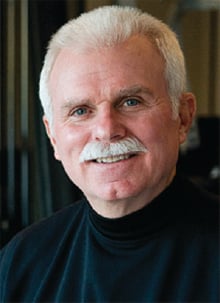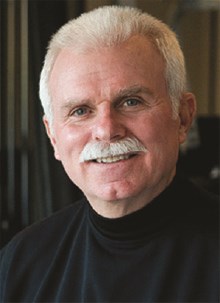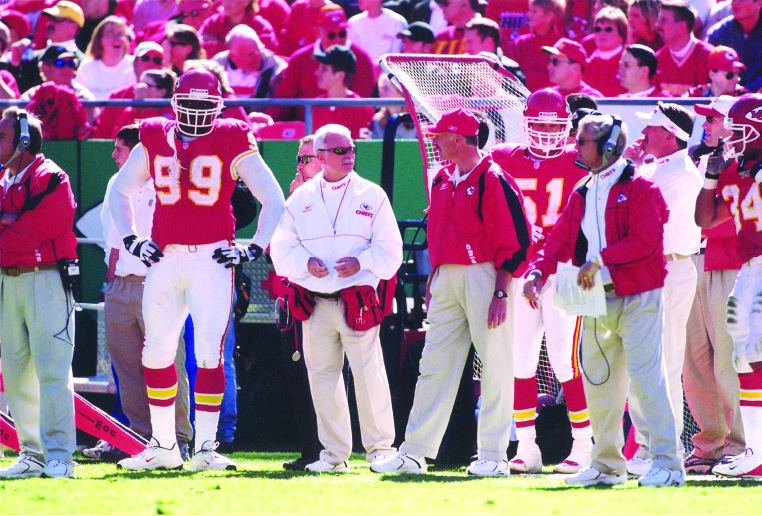
 Joseph F. Waeckerle, MD, FACEP
Joseph F. Waeckerle, MD, FACEP
This year we celebrated EMRA's 40th anniversary. Our organization has evolved with time, and has grown beyond what was ever anticipated at the time of its inception. Four decades ago, the Emergency Medicine Residents' Association was founded in a hotel bar in Dallas, Texas, by Joseph Waeckerle and a small handful of other residents. Since that time, Dr Waeckerle, who prefers the simpler moniker of “Joe,” has continued to be a leader in our field. A Kansas City native, Joe obtained his medical degree from the University of Missouri, and completed an emergency medicine residency in Kansas City in 1975. Dr Waeckerle's passion for emergency medicine has driven him throughout his entire life, from being the first chief resident at Kansas City General Hospital to his work as the first emergency team physician for an NFL team. The following is a speech he gave at the EMRA council meeting at the ACEP14 this year in Chicago, in recognition of EMRA and it's most important component — you, its members.
Good morning and thank you for inviting me here today. It is an extraordinary experience for me to be a part of this 40th anniversary of EMRA.
Ladies and gentlemen, colleagues, this is your morning, your time to look to your future, your time to consider your legacy-to-be. As you do, you most certainly envision a different world than we currently live in — a better world for you, your family and friends, your patients, and all of mankind. Your colleagues before you aspired to the same. Sadly, our generation hasn't really made the sweeping changes needed. Unfortunately, this world is not perturbed by the whimsical windmills of don Quixote. We have left you with even more formidable dilemmas than we inherited.
Today's medicine is beset by numerous and significant challenges:
- new and evolving diseases;
- moral and ethical dilemmas, including the duty to serve versus the duty to protect self;
- questions on the beginning of life, the right to life, the right to care, and the right to death;
- austere economic constraints;
- questions of privilege and obligation to insured, uninsured, and non-citizens;
- and dubious politicians who ironically will ultimately make our medical decisions.
Furthermore, our societies and our world are plagued by:
- social and economic inequities,
- religious zealots,
- racial intolerance,
- political and ideological radicalism,
- personal agendas,
- greed,
- and complacency.
Terrorism and war, murder and mayhem remain the solution du jour.
Not to mention:
- natural and man-made disasters,
- resulting displaced populations,
- and forecasted global calamities, including severe climate changes, rising sea levels, flooding, food and water shortages, and, more recently, asteroid strikes!
With this uplifting appraisal of our present challenges, we, and especially you, look to build a better future with proper solutions.
In the building process, it is always wise to first consider our past and appreciate our present. Leonardo da Vinci said “wisdom is the daughter of experience.”
Let us look to past experiences that brought us here today. In the spring of 1974, during the latter half of my first year of residency in our new emergency medicine program, while caring for a trauma patient, I was again being belittled by the chief surgical resident for not being a real resident in a real training program for a real specialty.
- After all, the “ER” was being adequately staffed by the surgeons with a few other “minor” specialties.
- “Emergency room medicine” was not even a recognized discipline, much less a recognized specialty.
- Emergency room medicine had no definitive academic or research body of knowledge or core content.
- Emergency room medicine instructors and “professors” were certified in real specialties.
- There were very few other emergency room medicine programs, maybe two or three, and very few emergency room medicine resident peers, maybe ten or so.
The three of us, the first class of our program, were accustomed to this arrogance and belittlement but we remained resilient and resolute. We were here because we believed that there was a need and that we could and would fulfill that need. Our mission was noble and our chair was always supportive.
However, this surgical resident on this afternoon over this severely injured patient struck a chord of lingering concern. Indeed, I had resigned from a superior orthopedic program with a promising future to commit to an uncertain future. Abandoning legitimacy, taking a leap of faith? Yes!
I knew what I was and where I wanted to go, but the fact that I had little to no input into my future and the future of my chosen specialty-to-be troubled me greatly.
Nope; not going to happen!
Ironically, like the surgical resident, I also was an arrogant young lion filled with little knowledge, little experience, and little wisdom. Yet, fueled by passion and bravado, I was committed and determined. I knew that I could make it better.
And that was the moment that my vision of EMRA was born. It came together later that spring as I met with four other “emergency room medicine” residents at the Sheraton bar at the UA/EM meeting in Dallas and presented my vision. Being like-minded, we all agreed to move forward together.
History documents the EMRA journey forward and here we are today:
- The Emergency Medicine Residents' Association's 40th anniversary.
- EMRA with nearly 13,000 “young lions.”
- EMRA with a respected voice sitting on every important organization in emergency medicine and many in the house of medicine.
Now, armed with some insight from whence you came, who are you at present?
You are very special. You are women and men of immense intellect, talent, and skill paired with sterling character and unwavering determination. You are women and men who care! You have rightfully earned the privilege to enter our world of emergency medicine, care for our patients, and shape our future. I congratulate and admire you for your accomplishments to date.
However, there is more to making the world a better place than taking a leap of faith or founding an organization, no matter how successful. Emergency medicine bestows the noble privilege of attending to all in need. With that privilege comes great responsibility and duty, which will be defining moments in your life, personally and professionally.
You pledge to care for any person who requests your help for any unforeseen illness or injury, any unattended illness or injury, any unaddressed illness or injury, or any emotional upheaval at any time. You stand first at the door of medicine to protect and to serve.
By doing so, you vow to provide timely evaluation, diagnosis, treatment and — most importantly — disposition based on need and severity no matter what the malady or what the circumstances.
You vow to deliver your care any time, any place, and anywhere you are needed. You may proffer your talent and skills in the ED, a clinic, an EMS vehicle, a neighborhood backyard, an entertainment event, a disaster incident, or anywhere there is a need or you are called.
You vow to attend without regard to your patient's character, attitude, personal or religious beliefs, or social or economic status. In some cases, without regard to personal risk.
You vow to offer worthy professional and personal service to your community, your country, and, in some instances, all of mankind as determined by others' needs and your abilities. If you haven't already, you will soon appreciate that this is no small pledge.
With that said, your time has come. You are now summoned to be our next leaders, so prepare to lead well! Leadership is from within. Others don't make you a leader. They may give you opportunity, guidance, or example, but you make yourself a leader. Now it is your time to make a difference, so pursue with passion the cultivation of these requisite characteristics of distinguished leadership.
Commitment
It goes without saying that all of the cardinal precepts of leadership follow commitment. For without a cause, where are you going, what are you doing, and why? For your cause, you must first appreciate your present to better see your future.
The greatest honor you will ever receive is for a person to ask you to care for them or their loved one in their moment of extreme angst. This is the defining moment of your profession. While it is given to you routinely, it is given profoundly! Never, ever forget this is an honor! You hold in your hands the equilibrium of life. This is a sacred trust given to you. There is no greater expression of trust. Do not betray the trust. Acknowledge and respect that trust by your fierce commitment to always being the best you can be for all who ask of you.
Determination
In those defining patient encounters and in all of life, you will revel in your successes and be terribly burdened by your non-successes. Occasionally, you will make mistakes. You are, after all, human. There is always someone bigger, faster, stronger, and smarter, but there does not have to be someone more determined. You can do anything; you can be anybody if you want it! You will not always succeed in the attempt for success, but you must never quit attempting — be resolute.
Integrity
Always do the right thing! Be true to yourself, your family and friends, your patient, your staff, and all around you. Do not compromise your principles; honor and integrity should define your character in all you say and do! The honor in your words and your fidelity to honesty and fairness will allow you to be part of the solution, not just part of the problem. And, all others you encounter in life's journey will be better for you.
Wisdom
Wisdom is a lifelong quest, and wisdom is a very personal quest. Michel de Montaigne once said, “We can be knowledgeable with other men's knowledge, but we cannot be wise with other men's wisdom.”
The history of our past experiences, successes, or failures — especially our failures — humbles and teaches us, and in that we gain greater wisdom. Find the wisdom in all that you say and do, in your thoughts, in your questions, in your listening, in your plan of action and its consequences, and in your decisions.
Knowledge is ever-changing but wisdom with humility is empowering and enduring.
Empathy
Treat all you meet with dignity and respect. Make every encounter personal and meaningful. Don't lose your empathy and don't lose your hope. More importantly, don't ever take away hope from others!
You do not administer protocols or deliver technology; you do not manage satisfaction scores; you attend to people, your patients. Convey caring and preserve hope through your words of compassion, actions of kindness and tenderness, and labors to sooth and heal. Quality care delivered with compassion must ultimately prevail.
Knowledge
We often hear that knowledge is power. No, it is not! Knowledge is forceful. Knowledge is dynamic. But knowledge is not the sacred end-all; it is temporal. Knowledge advances, and, in the process, corrects itself often.
What we do with knowledge is the real power! Be thinkers; temper knowledge with wisdom and integrity and determination.
Especially remember: as physicians, know what you know, and, more importantly, know what you don't know. Always admit your limitations and seek help when needed. Remain approachable, receptive, and teachÂable. Every person you encounter every day of your life will offer you a moment of knowledge if you are attentive and receptive. Look for it, receive it graciously, and give knowledge back with enthusiasm and respect. This is the ultimate in professionalism.
Courage
Leaders are required to make decisions and take action. Have the courage to act on your commitments and to act with integrity and empathy. Take that first step and “keep on keeping.” Do even the little things well. Success, no matter how small, breeds success.
Also, recognize that deciding to not act when inaction is the best solution is, in fact, taking action and often the more difficult choice. In spite of all adversity, be steadfast in your courage to make the best decision and act on it.
Confidence
Believe in yourself; don't doubt yourself. Franklin Delano Roosevelt once said, “The only limit to our realization of tomorrow will be our doubts of today.” You are your greatest limitation. You set your expectations; aspire to lofty aspirations, then attain them. Don't wake up tomorrow failing to realize your goals of today.
Inspiration
To inspire, you must believe. To believe, you must have faith.
You will confront numerous difficult challenges in your personal and professional career, and in the process you will question and often find no answers. Accordingly, you will need a core belief system as many answers are unfathomable and, ultimately, all you have is your faith.
To doubt is very human. We all doubt; life is sometimes very mysterious, cruel, and inexplicable. So, define your faith, whether faith in your supreme being, faith in yourself, faith in your fellow man, or faith in the cosmos. Trust your faith; stay the course. And, as you travel your journey, rally others with your steadfast faith!
Interpersonal skills
Life's journey is not traveled alone. Surround yourself with brilliance and trust in it.
- Empower and respect your colleagues.
- Foster a constructive work environment and colleague cooperation.
- Build a team, share visions, and encourage creativity and flexibility.
- Listen and learn, communicate and compromise when needed, and then craft solutions.
- In the process, always give more than you take.
Ultimately, through your trust in others and skillful management, all involved with you will be rewarded and renewed greatly and, in that, you accomplish greatness.
Responsibility
Nurture your nature. The stresses of the practice of emergency medicine and the stresses of life are onerous and cumulative. Life is not fair.
You can do so much for so many in extreme situations, but, frequently, you can do so little despite Herculean efforts. Success and failure are intertwined. There are no guarantees.
Your unwavering dedication and compassion makes you even more vulnerable to the inherent strains and tensions of emergency medicine. You are more vulnerable because of your empathy and caring for your fellow man! You are human.
As such, your chosen path extracts a heavy emotional and physical toll. No matter how dedicated, altruistic, and principled of character, you will waver in your course. We all have and we all will. But, appreciate that to whom much is given, more is expected. Only then, can you try harder and give more.
The Golden Rule states that you must love others as you love yourself. You are obviously committed to others. But, this rule implies that you must love and respect yourself first; for if you don't, you can't expect others to do so and follow.
By enhancing and enriching your personal lives, you will find strength and balance in your professional lives.
- Revere your soul.
- Cherish your life.
- Nurture your gifts: mind, body, and spirit.
- Seek opportunity and take advantage of it.
As a leader, you give others opportunity and you expect them to take advantage of the opportunity. As a leader, you must also demand of yourself that you take advantage of opportunity. Do not stagnate in your personal development.
Your personal growth will be a guiding light to keep you in balance and harmony. It will allow you to better love your family and friends, and allow others to follow in dark and difficult times.
In conclusion, this is your time. This is the journey of your life. Now is the writing of your legacy and you are the author. Make your book of life meaningful through the development of exceptional talent and character. Then, be exceptional in your leadership.
We now place our trust in you. Go forward with excellence, achieve greatness, and make a difference.




